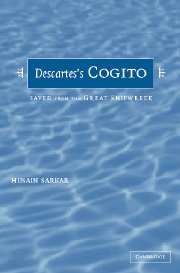Book contents
- Frontmatter
- Contents
- Preface
- Acknowledgments
- Abbreviations
- Descartes' Cogito
- 1 The Prolegomena to Any Future Epistemology
- 2 The Problem of Epistemology
- 3 The Solution: Cogito
- 4 A Skeptic against Reason
- 5 The Five Ways
- 6 Cogito: Not an Argument
- 7 The Content of the Cogito
- 8 Memory, Explanation, and Will
- Appendix A Comments on Jeffrey Tlumak's “Certainty and Cartesian Method”
- Appendix B Comments on Robert Nozick's “Fiction”
- Appendix C Cogito and the Port-Royal Logic
- Appendix D Bacon and Descartes
- Appendix E Comments on Anthony Kenny's “Descartes on the Will”
- Bibliography
- Name Index
- Subject Index
8 - Memory, Explanation, and Will
Published online by Cambridge University Press: 01 September 2009
- Frontmatter
- Contents
- Preface
- Acknowledgments
- Abbreviations
- Descartes' Cogito
- 1 The Prolegomena to Any Future Epistemology
- 2 The Problem of Epistemology
- 3 The Solution: Cogito
- 4 A Skeptic against Reason
- 5 The Five Ways
- 6 Cogito: Not an Argument
- 7 The Content of the Cogito
- 8 Memory, Explanation, and Will
- Appendix A Comments on Jeffrey Tlumak's “Certainty and Cartesian Method”
- Appendix B Comments on Robert Nozick's “Fiction”
- Appendix C Cogito and the Port-Royal Logic
- Appendix D Bacon and Descartes
- Appendix E Comments on Anthony Kenny's “Descartes on the Will”
- Bibliography
- Name Index
- Subject Index
Summary
The aim stated in the last chapter is pursued further in this final chapter. That aim is to demonstrate how interpretations of various philosophical theories of Descartes cohere with the core interpretation that the cogito is not an argument. Three additional such philosophical theories of Descartes are examined here, theories that have no overt connection with one another – namely, his theories about memory, logic and explanation, and will. I trust that their mutual independence (something akin to independent testability) will strengthen my interpretation of the cogito.
In section I, Descartes' distinction between two types of memory is drawn; this distinction is then examined, and it is shown how it lends added support to the core argument. Now, Descartes had interesting things to say about the nature and logic of discovery and explanation, and he prided himself on differing from the traditional study of logic. When we take this aspect of Descartes' thought into consideration – section II is designed for that purpose – it further strengthens the central thesis. Finally, in section III, I analyze Descartes' theory of the will – not all aspects of it, but just that aspect that contributes to the central thesis of this book.
The Role of Memory
There are two types of memory, according to Descartes. I shall call them physical memory and intellectual memory, respectively. In the terminology of Descartes' posthumously published Treatise of Man, “the seat of memory” lies in the internal part of the brain.
- Type
- Chapter
- Information
- Descartes' CogitoSaved from the Great Shipwreck, pp. 236 - 268Publisher: Cambridge University PressPrint publication year: 2003



